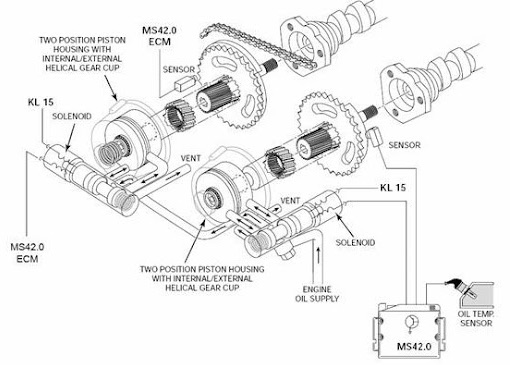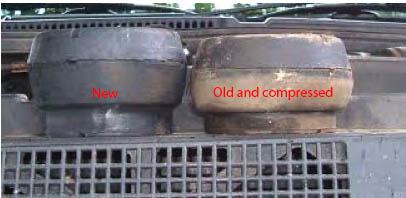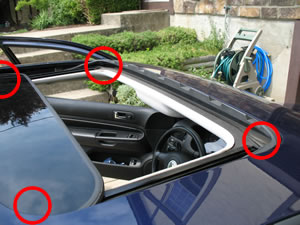Posted on 2/23/2025
Which Oil is Right for My Car? A Complete Guide to Choosing the Best Oil for Your Vehicle When it comes to keeping your car running smoothly, one of the most important things you can do is choose the right engine oil. Engine oil lubricates your car’s engine, reduces friction, cleans contaminants, and helps prevent excessive wear and tear. But with so many different oils on the market, how do you know which one is right for your car? Let’s break down the types of oils available, the different oil weights, and why using the right oil and changing it regularly is crucial for your vehicle's longevity. Understanding Oil Weights: What Do the Numbers Mean? Oil weight refers to the oil’s viscosity, or thickness, and how well it flows at different temperatures. When you look at an oil container, you’ll often see numbers like 5W-30, 10W-40, or 0W-20. The first number represents the oil's viscosity at cold temperatures, while the ... read more
Posted on 2/23/2020
BMW Water Pump Replacement. BMW carries electric water pumps on the N51, N52, N54, N55, engines that need to be replaced every 50,000-75,000 miles. A few advantages of the BMW’s electric driven water pump are equal distribution of coolant (since the pump is not belt driven) and increased power. Water pumps play a critical role in keeping your BMW’s engine within proper operating temperature. Without a properly working water pump and thermostat your BMW will soon overheat and breakdown. When replacing the water pump we recommend changing the thermostat as well. It’s important to take your car to a BMW specialist when replacing the water pump since there are special installation procedures as well as bleeding procedures that will need to be carried out after installation. Some common DME codes associated with a failed or failing water pump are 2E81- Electric coolant pump speed deviation, speed outside specified range ... read more
Posted on 2/20/2020

What is a BMW VANOS? Put simply, a VANOS is a mechanism that allows for the adjustment of the camshafts for the intake and exhaust valves. This allows for better gas mileage, smoother idling increased power/torque. Vanos solenoids control the flow of oil to the VANOS. When oil flow is restricted to the VANOS problems will occur i.e check engine light, reduced power, low gas mileage, rough idling. It is common for the solenoids to clog up and fail. This can may be due to Electrical failure of VANOS Solenoid Dirty Oil Low oil pressure Clogged up solenoid/solenoid screen Aftermarket/defective oil filter An experienced BMW Technician will properly assess the condition of the VANOS solenoid on your BMW first to ensure they are in proper working order and the oil is in good condition as a first step in addressing any VANOS engine codes on your BMW. Common symptoms of VANOS issues are Check Engine Light Loss of Power Rough Idle, engine hesitation Engine fa ... read more
Posted on 2/8/2018
.jpg)
Land Rover Air Suspension Issues If you drive a Land Rover, chances are the soft, comfortable ride is one of the main features that won you over. Then, once you took a closer look, you found the suspension is adjustable depending on road conditions, elevation changes, and even parking situations. It’s pretty neat stuff. The suspension on many Land Rover brand vehicles is air suspension, but you probably already know that. It’s electronically controlled with that selector on your console which provides precision adjustments from the compressor to each of the air struts. Unfortunately, as much as we’d like vehicle parts to last forever, it’s not always the case. the Land Rover’s electronic air suspension is no different, and when it fails, it often does so in spectacular fashion. Leaking Struts The issue usually starts out as a minor air leak in one of the strut air bladders or lines. Just a tiny leak can cause the stru ... read more
Posted on 2/6/2018

The streets of Brooklyn are notoriously rough. Not the people, the actual road surfaces. When you drive over speed bumps in parking lots, potholes in backlanes, and the breaks in the road everywhere else, any problems with your suspension are accentuated. If your strut mounts are worn, this is where they are going to tell you. It's a common problem in several Volkswagen models. Jettas, Passats, New Beetles, and Golfs all have similar designs, though the others aren’t exempt. Here’s what you’ll find: As you drive over any surface that creates travel in your struts, you’ll probably hear a rattling noise from the front. It can happen on just slight suspension travel, over only bigger bumps, or it could happen all the time. Over larger bumps or potholes, you’ll get a loud clunk. It’s not exactly a metallic noise – it sounds dampened. This noise happens when the strut is fully extended. When you turn, you might get some noise and you m ... read more
Posted on 11/28/2017

Range Rover Water issues 2004-2008 The water coming into your range rover is usually caused when the connecting elbow at end of the sunroof drains fail. (degraded sunroof drain connectors) Once these rubber elbows give way, the drains hang free and redirect all the water onto the floorboards of your Land Rover. The hose on the passenger side of the vehicle is located behind your Junction Box Electronics (JBE). The hose on the driver side is located in a similar location and is easier to access. Simply remove the kick panel and side panel around the OBD connector and you should be able to locate the drain hose rather quickly. Part of the wiring harness is located at the lowest point along the front floorboards so it is important the get the water issue in your Land Rover taken care as soon as you become aware of it as water damage to your wiring harness is soon to follow. (Corroded wire) Common electrical issues experienced as a ... read more
Posted on 11/8/2017
.jpg)
Genuine Vs OE vs OEM vs Aftermarket When trying to buy your own parts for you BMW, VW, Audi, Land Rover, Mini Cooper or Mercedes it’s easy to get confused. Here are some simple definitions for OE, OEM, Genuine, factory & Aftermarket to help guide your purchasing decisions. OE = Genuine = Factory = Original. They all mean the same thing. Parts that are packaged in Volkswagen boxes with the VW logo, BMW Boxes with the BMW logo, Land Rover boxes with the Land Rover logo etc etc OE = Original Equipment OEM = Original Equipment Manufacturer They are produced in the same plant by the same manufacturer. The key difference between OE & OEM is the markup Audi /BMW/ Land Rover adds to the OE part. Automotive companies dictate the specifications to the manufacturer. The OE/OEM manufacturer must adhere to consistent production and quality. OE part= Audi package, Higher cost, OEM ... read more
Posted on 3/30/2017
.jpg)
Volkswagen: What High Mileage VW Problems to watch for You’ve long heard about the long-term reliability of Volkswagen models of all kinds, particularly the Golf and Jetta. It’s true – VWs of all shapes and sizes are some of the longest-lasting, most reliable vehicles you’ll ever find on the roads today, which is why you see them used well beyond 200,000 miles on a regular basis. Unfortunately, no matter whose car you drive, it’s going to experience an issue or two when you’re looking at a high-mileage situation. What problems should you be on the lookout for? What is common to experience when the odometer reading climbs up there? Volkswagen High Mileage Transmission Concerns Transmission maintenance tends to be pushed aside for many car owners. It’s not regarded with as much importance as engine maintenance, though with intervals of 60,000 to 100,000 miles, timing is critical. Transmission fluid needs to be kept clean to prevent internal w ... read more
Posted on 12/15/2016

Which one is the right oil for my car? 5W-30, 0W-30 what does it all mean?Viscosity Viscosity Viscosity The title of the oil is meant to communicate the type & thickness of the oil at different temperatures (having the correct thickness a.k.a. viscosity is what this article will be mostly about). The W in the name 5W-30 standards for Winter and simply means this oil has been tested at colder temperatures. (Oils without the W in their name i.e. SAE 30 have not been tested for cold weather performance. At normal operating temperatures (210°F) 5W-30 and 10W-30 will both flow at a SAE viscosity of 30, but under much colder temperatures 5W-30 will flow at an SAE viscosity of 5. 10W-30 will flow at an SAE viscosity of 10. 0-W30 will flow with a viscosity of zero in cold t ... read more
Posted on 9/21/2016

Why servicing your Drains is important for your VW/BMW/Audi WHAT ARE DRAINS/PASSAGES AND WHY DO I NEED THEM CLEANED? First off lets get the terminology straight. Passages, Ducts, or Drains are interchangeable terms to describe a series of tubes and passages within the frame of your car specifically designed to channel water that lands on your roof and windshield down to the street below. Cleaning out these passages to keep them free from obstructions and clogs is absolutely essential for keeping your VW in good working order. Falling leaves, flowers, dust, dirty and other objects accumulate in and around these passages over time. Should any of these passages on your Volkswagen become clogged, water that normally flows down to the street can be redirected to the interior of your car, causing not only a musty wet smell that is unhealthy, but also electrical issues. The wiring harness on ... read more